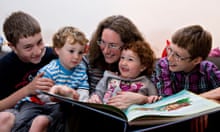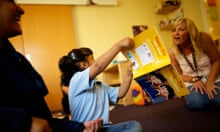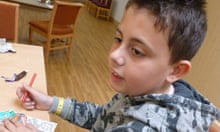For most families, Christmas is a time of celebration and fun. The odd bah-humbug moment aside, most of us would probably admit to enjoying the sheer indulgence of it all. If, however, a member of your family has autism and/or a learning disability, it may be a different story.
Kerrylee Doxsey has three sons. Her middle son, George, has cerebral palsy, autism, epilepsy and severe learning disabilities. George hates any change in his routine, and Christmas is a nightmare for the family.
"The build-up to Christmas is intolerable for George," says Kerrylee. "The lights, the crowds, the queues in shops. It all makes him extremely anxious. If anyone pops round with a gift, George will drop to the floor and start head-banging. Even phone calls wishing us a happy Christmas will set him off.
"We are no longer invited to family gatherings because of his behaviour. We'd love to have a 'normal' Christmas for the other boys, but instead it has to be like every other day or George can't cope."
Kerrylee's experience will be recognised by many other families caring for someone with autism and other forms of learning disability. Christmas can be an extremely stressful time for parents who have to balance the whole family's needs.
Netbuddy has collected the following tips and advice for surviving the festive season from families of people with learning disabilities:
Sensory overload
The disruption to the normal routine, unfamiliar sights and smells, crowds, lights, the house full of noise and people – Christmas viewed from the eyes of someone with autism or learning disabilities takes on a totally different perspective.
Try and look at the world from your child's angle. Schedule in daily activities to give them your undivided attention, even if it's only for 10 minutes. Give them some Christmas-free time every day.
Create a Christmas-free zone in your home where your child can feel safe. If they really can't cope with any changes in the house, encourage your other children to decorate their own bedrooms.
Many people with autism find the strong smells associated with Christmas difficult to handle. Try introducing new smells gradually. Add cinnamon to your child's playdough, for example. Ask visitors to hold off on the perfume when they come to visit.
Presents
Choosing a gift for a family member who has learning disabilities can be a struggle. Finding a present that is age-appropriate but also suitable for someone's ability and development, is never easy.
"People often give Sam presents he can't play with or that he'll just break," says one parent. "It is so difficult explaining to relatives why something they've bought isn't suitable."
Many people with autism and/or learning disabilities get a particular comfort from familiarity. Unwrapping presents and opening new things can create anxiety and confusion. The expectation to open one present after another on Christmas Day is often overwhelming.
A good solution could be to ask friends and family to donate towards a single present. That way, you can choose something suitable, which will get used, and your child won't be overloaded with gifts.
Also, try wrapping up some favourite toys. It can be very reassuring to unwrap something familiar. Netbuddy has created a Christmas gift guide of suitable presents for people with learning disabilities, which have all been road-tested by families.
Siblings
Balancing the needs of people with learning disabilities and their siblings can be really difficult at Christmas. "Sarah finds it so hard to be happy and jolly with all her friends, then come home to a house where Christmas is essentially cancelled," says one parent. "I feel like I'm taking away part of her childhood."
Try and make time for Christmas activities with siblings, even if it's just for an hour or so a day. Try taking turns with your partner to do things individually with them.
Don't be afraid to ask for help. Friends and family may not know how to support you unless you tell them. Enlist their help to look after your child with additional needs, while you focus on Christmas activities like school plays, visits to Santa's grotto or carol singing with your other children.
The big day
Many parents of children and adults with learning disabilities worry about how relatives will react to their behaviour. Talking to them in advance about your child's specific needs will really help. Ask for their support and let them know this will make the whole experience better for everyone.
If Christmas Day is at another family member's home, make sure there will be a calm room or space where your child can go if it all gets too much. Pack a backpack with their favourite things, which they will find comforting if they get over-stimulated.
If you are hosting, try not to overstretch yourself. Your child will pick up on your stress levels, so keep your plans simple.
Give your child jobs, such as taking coats and offering nibbles round. Giving them something to do will reduce the stress of having people in the house. Try giving them an itinerary in advance so they know what will be happening throughout the day and they understand, for example, that people stand around and chat a lot.
Emma Sterland is the website manager of www.netbuddy.org.uk, a practical tip-swapping site and online community for parents, carers and learning disability professionals
Why not join our community? Becoming a member of the Guardian social care network means you get sent weekly email updates on policy and best practice in the sector, as well as exclusive offers. You can sign up – for free – online here.





